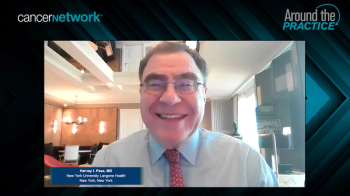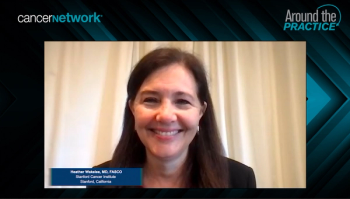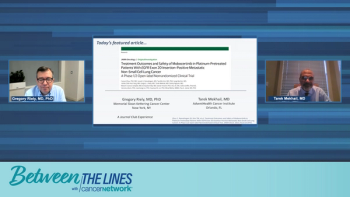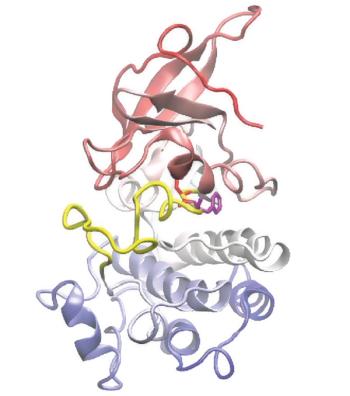
Lung Cancer
Latest News
Latest Videos

More News

Optimal Molecular Testing Strategies in Non–Small Cell Lung Cancer
Expert perspectives on the current landscape of molecular profiling in patients with non–small cell lung cancer.

Solange Peters, MD, PhD, Reviews Evolving Treatment Trends in Lung Cancer
“Be courageous: Your work will be recognized, and everything is about [the] work in the end.”

Before closing out their discussion on non–small cell lung cancer, experts share excitement for possible improvements in the setting of perioperative therapy.

Experts consider when and if it would be appropriate to utilize targeted or immunotherapy in patients with EGFR exon 19 deletion–positive NSCLC.

Patient Profile 2: EGFR Exon 19 Deletion–Positive NSCLC
Shared insight on the diagnosis and management of EGFR exon 19 deletion–positive NSCLC, with regard for the potential of osimertinib in this setting.

NSCLC: Selecting Therapy Based on PD-L1 Status and Staging
A brief review of how treatment may be selected for a patient with NSCLC based on their PD-L1 expression and disease staging.

IMpower010 and KEYNOTE-091: Adjuvant Immunotherapy in NSCLC
Expert perspectives on the IMpower010 and KEYNOTE-091 trials, which assessed adjuvant immunotherapy in non–small cell lung cancer.

CheckMate-816: Neoadjuvant Chemoimmunotherapy for NSCLC
Shared insight on the CheckMate-816 trial and how immunotherapy may have a role in the neoadjuvant setting of non–small cell lung cancer.

Role of Immunotherapy in Newly Diagnosed NSCLC
A broad discussion on the role of immunotherapy in newly diagnosed NSCLC in both the neoadjuvant and adjuvant settings.

Patient Profile 1: Stage IIB NSCLC With High PD-L1 Expression
Shared insight on a patient profile of newly diagnosed non–small cell lung cancer with high PD-L1 expression and no driver mutation.

Expert panelists look at all factors that inform treatment selection when managing a patient diagnosed with non–small cell lung cancer.

Comprehensive discussion on how biomarker testing and multidisciplinary care can improve the management of non–small cell lung cancer.

Anetumab ravtansine yielded a manageable safety profile in patients with relapsed mesothelin-positive malignant pleural mesothelioma in the second-line setting, but it did not appear to be superior to vinorelbine.

Although clinical trial enrollment declined among patients with lung cancer from 2019 to 2020 during the COVID-19 pandemic, mitigation strategies helped to improve enrollment.

Next Steps in the Management of EGFR Exon 20 Insertion–Positive mNSCLC
Closing out their discussion on mobocertinib data and the EXCLAIM cohort, experts share hope for the future management of the EGFR exon 20 insertion–positive mNSCLC.

mNSCLC: Biomarker Testing and Patient Adherence to TKIs
A brief review of biomarker testing in metastatic non–small cell lung cancer to identify alterations such as the EGFR exon 20 insertion.

EXCLAIM Cohort in mNSCLC: Treatment Selection and Management
In the context of mobocertinib clinical data, experts consider factors that help them select therapy and manage therapy for patients with EGFR exon 20 insertion–positive mNSCLC.

EXCLAIM Cohort: Mobocertinib Safety Data in mNSCLC
Focused discussion on the safety profile of mobocertinib in platinum-pretreated EGFR exon 20 insertion–positive mNSCLC given data from the EXCLAIM cohort.

Expert Commentary on the Product Profile of Amivantamab-vmjw
In an interview with ONCOLOGY®, Evan B. Bryson, PharmD, BCOP, offers a comprehensive review of real-world treatment considerations of amivantamab as therapy for patients with non–small cell lung cancer.

Efficacy Data From the EXCLAIM Cohort in mNSCLC
Shared insight on efficacy data with mobocertinib from the EXCLAIM cohort of patients with platinum-pretreated EGFR exon 20 insertion–positive mNSCLC.

Mobocertinib Use in mNSCLC: EXCLAIM Cohort Study Design
Expert oncologists review data from the EXCLAIM cohort, which analyzed mobocertinib use in platinum-pretreated patients with EGFR exon 20 insertion–positive mNSCLC.

The TERAVOLT study identified 7 factors associated with increased mortality risk for patients with thoracic malignancies who have contracted COVID-19.

Expert Commentary on the Product Profile of Mobocertinib
In an interview with ONCOLOGY®, Megan May, PharmD, BCOP, offers a comprehensive review of real-world treatment considerations of mobocertinib as therapy for patients with lung cancer.

The 2021 United States Preventive Services Task Force lung cancer screening criteria changes successfully reduced racial disparities in eligibility by broadening screening eligibility criteria.

Low-Dose CT Screenings Associated With Lung Cancer Overdiagnosis in Nonsmoking Asian Women
Investigators believe that low-dose CT screenings should only be offered to heavy smokers after identifying an association between the diagnostic and an overdiagnosis in nonsmoking Asian women.














































